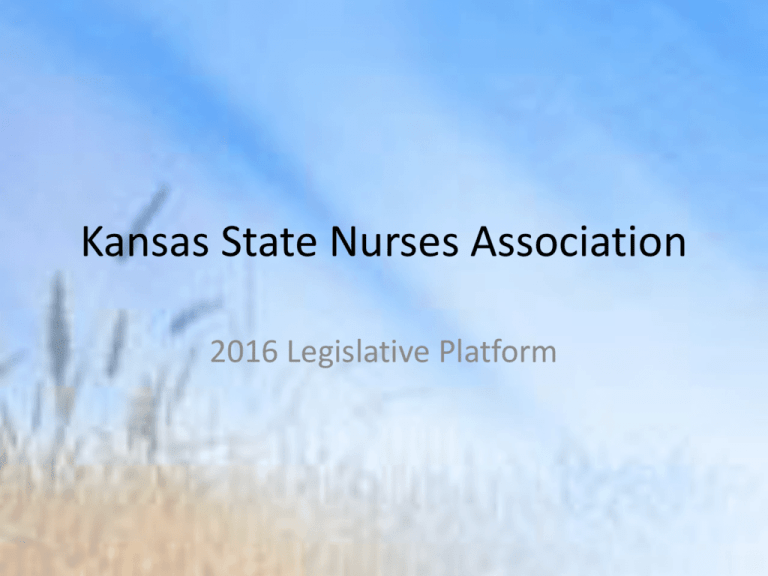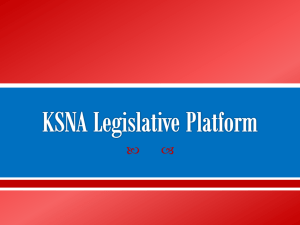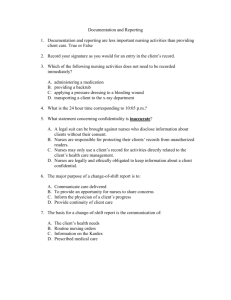KSNA Legislative Platform - Kansas State Nurses Association
advertisement

Kansas State Nurses Association 2016 Legislative Platform The Kansas State Nurses Association provides leadership for the nursing profession and promotes quality health care for consumers through education, advocacy, and influencing of healthcare policy. As the professional association for registered nurses, KSNA supports: Nursing Practice & Education 1. Representation by KSNA on all interdisciplinary bodies concerned with planning, implementing, evaluating health care services. 2. Recognition of the KSBN as the sole regulatory authority for professional nursing practice and the provision of adequate funding for the agency. 3. Ensuring the composition of the KSBN includes members whose professional qualifications relate to the functional responsibility of the state regulatory agency for practice/education. 4. Promoting the role, protecting the practice of RNs. Nurses should practice to the full extent of their education/training. 5. Efforts aimed at addressing an adequate supply of nursing workforce include expanding state funding to educate more nurses at all levels of nursing and encourage recruitment and retention by employers. 6. Funding for research to maximize nursing’s contribution to health, nursing education programs, nursing faculty salaries, and advanced education for nurses. Bills to follow. . . • HB 2482 Amends and clarifies The Nurse Educator Service Scholarship Program Act that grants scholarship funding to nursing students who attend a school of nursing within the State of Kansas that is approved by the KSBN to grant a Master of Science or Doctoral Degree in Nursing, and who also agree to be a nurse educator in Kansas. • SB 9 Cannabis Compassion and Care Act (Medicinal Marijuana) • HB 2058/SB 265 The Kansas Caregiver Advise, Record, Enable (CARE) Act sponsored by AARP the requires documentation of the name of the caregiver upon admission and mandates discharge teaching. Workplace Advocacy 1. The right of official representation on employment matters affecting nurses as employees and as professional practitioners. 2. Maintenance of laws germane to the practice of nursing. 3. Registered Nurse staffing standards that ensure quality patient care. 4. Enactment of legislation that protects the economic and employment rights of nurses, including their right to advocate for patients. 5. Policy initiatives aimed at violence prevention. Bill to follow . . . • HB 2313 Healthcare Worker Assault Legislation sponsored by ENA, law enforcement, KMS, EMS, and KHA, making assault on a healthcare worker a high level misdemeanor. Consumer Advocacy 1. Efforts to develop evidence-based health policy to ensure equal access to health care services and safe competent nursing care for individuals in the state of Kansas. 2. Establishing, implementing, and maintaining safeguards for the rights of all citizens, especially children, senior citizens, the disabled, and the economically and socially disadvantaged. 3. Efforts aimed at health promotion, early intervention, treatment, and referral. 4. The ability of individuals to select an appropriate health care provider of their choice. 5. Efforts aimed at eliminating substance abuse including tobacco and alcohol. Bills to follow . . . • SB 274 Increase unbelted seatbelt fines from $10 to $60 that would also fund the SAFE program, a seat belt education program for Kansas high schools. • HB 2451 Expanding mandatory reporters of child abuse (adding animal control officers . . . and persons authorized to take custody of an animal . . .when investigating suspected cruelty to animals.) • HB 2515 Abolishing the death penalty and creating the crime of aggravated murder and provide for sentences of imprisonment for life without the possibility of parole. The legislation would not be retroactive to people on death row nor apply in cases where the crime was committed before July 1, 2016. Occupational & Environmental Health 1. Resources to increase the capacity of nurses to prepare and respond to disasters. 2. Legislation and regulation that assures workplace safety and promotes occupational and environmental health. 3. Research and education for the prevention and treatment of occupational and environmental health issues, through health policy initiatives. Financing Health Care 1. Funding to provide health care, mental health services, food, and shelter to persons in need. 2. Recognition of nursing’s unique role in the delivery of comprehensive and cost-effective quality care. 3. Ensuring funding for state health plans, public health, and public health nursing services. 4. An affordable health care system that is monitored to insure that quality care, quality of life, and patient safety are not compromised. 5. Use of evidence-based cost containment incentives in the health care delivery system that do not compromise quality of care. Issues to monitor • The Community Paramedic proposal • Medicaid expansion • Opiates-Pain Medication Guidelines being adopted in some states. • Full practice authority for APRNs in the VA • Fee Fund sweeps: KSBN and Children’s Initiatives Fund





